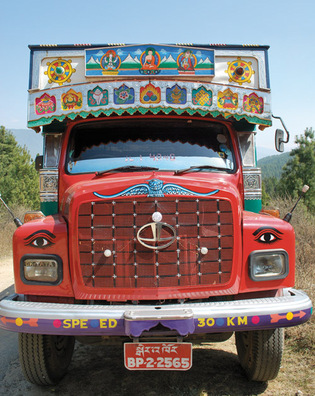 loading
loading
Nation of the forest Cathy ShufroEmbellishments on this truck are Buddhist symbols said to bring good luck. View full imageIn 1972, Bhutan’s 17-year-old king, Jigme Singye Wangchuck, famously declared that “Gross National Happiness is more important than Gross National Product.” By 2005—when the king shocked the nation by announcing that he would transfer power to an elected parliament—the idea of gross national happiness had gained so much traction that it was written into the constitution. The second clause of Article Nine reads: “The State shall strive to promote those conditions that will enable the pursuit of Gross National Happiness.” By the late ’90s, the government had worked out four “pillars” of GNH: environmental conservation, cultural preservation, good governance, and sustainable and equitable socioeconomic development. The next step was to design a system for quantifying GNH; for this, the government commissioned an independent think tank, the Centre for Bhutan Studies. Its staff came up with nine categories. Some are socioeconomic measures standard in industrialized countries, such as household income, education level, and health status; some are not so standard, such as psychological well-being, biodiversity, and how people use their time. During 2006–2007, the Centre for Bhutan Studies gauged overall national happiness by interviewing nearly 1,000 Bhutanese—measuring psychological well-being, for instance, by asking how often the interviewees felt jealous, and cultural preservation by how proficient they were in zorig chusum, the 13 traditional crafts of Bhutan. (The results: 45.2 percent of Bhutanese were “very happy,” 51.6 percent “happy,” and 3.2 percent “not very happy.”) Does the king’s 1972 declaration mean GNH is more important than economic growth? Dechen Dorji ’01MEM, an assistant to the current king, says GNH doesn’t compete with economic development; rather, it complicates decisions about which growth strategies to pursue. Society has to measure not only cash changing hands but also how policies and projects affect happiness—not individual happiness, but collective well-being. “The GNH philosophy is a kind of development conscience,” Dechen Dorji says. Today, when proposals for major development projects go to Thimphu for vetting, among those consulted are officials of the Gross National Happiness Commission. UN programs also adhere to GNH precepts. Karma Rapten ’98MEM tells of a 2009 project in the high-altitude Lunana region designed to prevent floods caused by melting glaciers. As head of the Energy, Environment, and Disaster Management Unit for the UN Development Programme in Bhutan, he oversaw the merging of several glacial lakes. Before work began, two monks trekked for ten days into the mountains to bless the undertaking and a stone chorten—a sacred reliquary—built by the laborers. The ceremony, Karma Rapten explains, provided “mental satisfaction that nothing happens to people working up there. Plus, you are asking the blessings of the local deities.” Forest conservation lies at the heart of the Gross National Happiness effort. The constitution requires that 60 percent of the country remain forested “for all time.” But a mandate is only a first step. Safeguarding forests requires management plans, policies, research, and to carry them out, it requires trained environmental specialists.
|
|